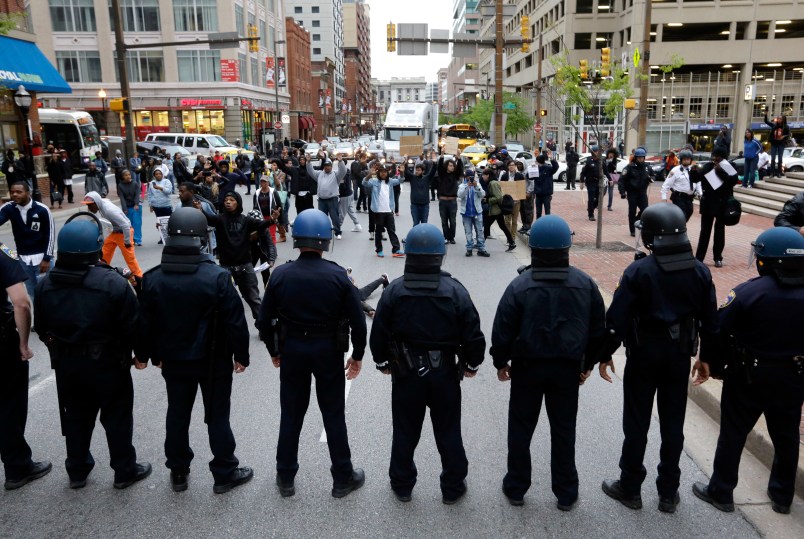Brendan James wrote up this column by Rich Lowry in Politico in which Lowry says that to protestors “some black lives really don’t matter.” In part, this is no more than a more biting version of the old saw of ‘why don’t blacks get more upset about black on black crime?.’ – a high-toned form of concern trolling.
I’m not interested in digging into the outrage tug of war over this. But there’s a pretty elemental blindspot to all these arguments.
Let’s back up first for some context.
After the protests following the death of Freddie Gray in Baltimore, the murder rate has gone up substantially. And residents say the police have close to disappeared. Whether the police are on a de facto strike or simply spooked by the indictment of several colleagues is up for debate in the city. But Lowry’s point is that protestors don’t really care about these black lives. It only matters when black men or women die at the hands of the police, particularly white police officers. Those lives ‘matter’; the others don’t.
There’s a sliver of truth to this. The death of an African-American man or woman at the hands of a white police officer has an iconic resonance under the shadow of American history and rattles through all sorts of contemporary inequalities that it may or may not have anything to do with. That inevitably garners attention and outrage.
But this isn’t the main point. The main point is this: people think a huge amount about criminals and murderers. In fact, as a society we’ve formed huge urban paramilitary organizations to combat these people – i.e., the police department.
We also have a whole bureaucracy of courts, judges, probation officers and mass facilities for housing these people – i.e., courts and prisons.
So yes, people really do care a lot of about criminal violence and crime. And in fact we take for granted that we have a whole portion of the state dedicated to tracking these people down, capturing them and imprisoning them. It is really not a surprise that people react differently when the people charged with protecting the population end up killing innocent people or people who may have committed some crime but who posed no threat that would merit deadly force.
Consider this.
We routinely see Jews who die of diseases, get mugged, die in auto accidents. But if a Jew dies in what might be an anti-semitic attack, it’s huge news and a major public controversy. A similar logic applies to gays in hate crimes or African-Americans. This doesn’t mean that those other deaths don’t matter. It means that we are extremely phobic and reactive as a society to any form of discrimination and particularly violence based upon it.
For these purposes, it doesn’t even really matter whether you think these incidents are the product of ingrained racial bias or the perception of racial bias projected onto incidents which have no connection to it. The perception explains the reaction. Again, not complicated.
And no, before you hyperventilate about comparing cops to anti-Semites, that’s not what I’m doing. But the analog is highly illustrative. Violence tied on racism (perceived or real) gets outsized attention, particularly when its on the part of the state.
Yes, there’s certainly some radical chic aspect to some white protestors gravitating toward the outrage of allegedly unwarranted police killings. There’s also the recurrent reality that people latch on to tragedies that appear to capture a greater social injustice but end up not lining up as nearly with those greater concerns than it first appeared. Yes, yes, yes. But Lowry glides over the fact that the protestors he’s talking about are overwhelmingly African-American citizens from the affected communities. So his real point here is that African-Americans from violence-ridden neighborhoods don’t actually care enough about themselves to merit anyone else caring about potential abuses of them – an unlovely assertion when stripped to its essentials.
Really the whole thing is no different from stating the obvious, which is that people hold police to a higher standard.
This isn’t complicated. And yes, people think crime is a big deal and a bad thing. That’s why we have courts. That’s why we have police.






